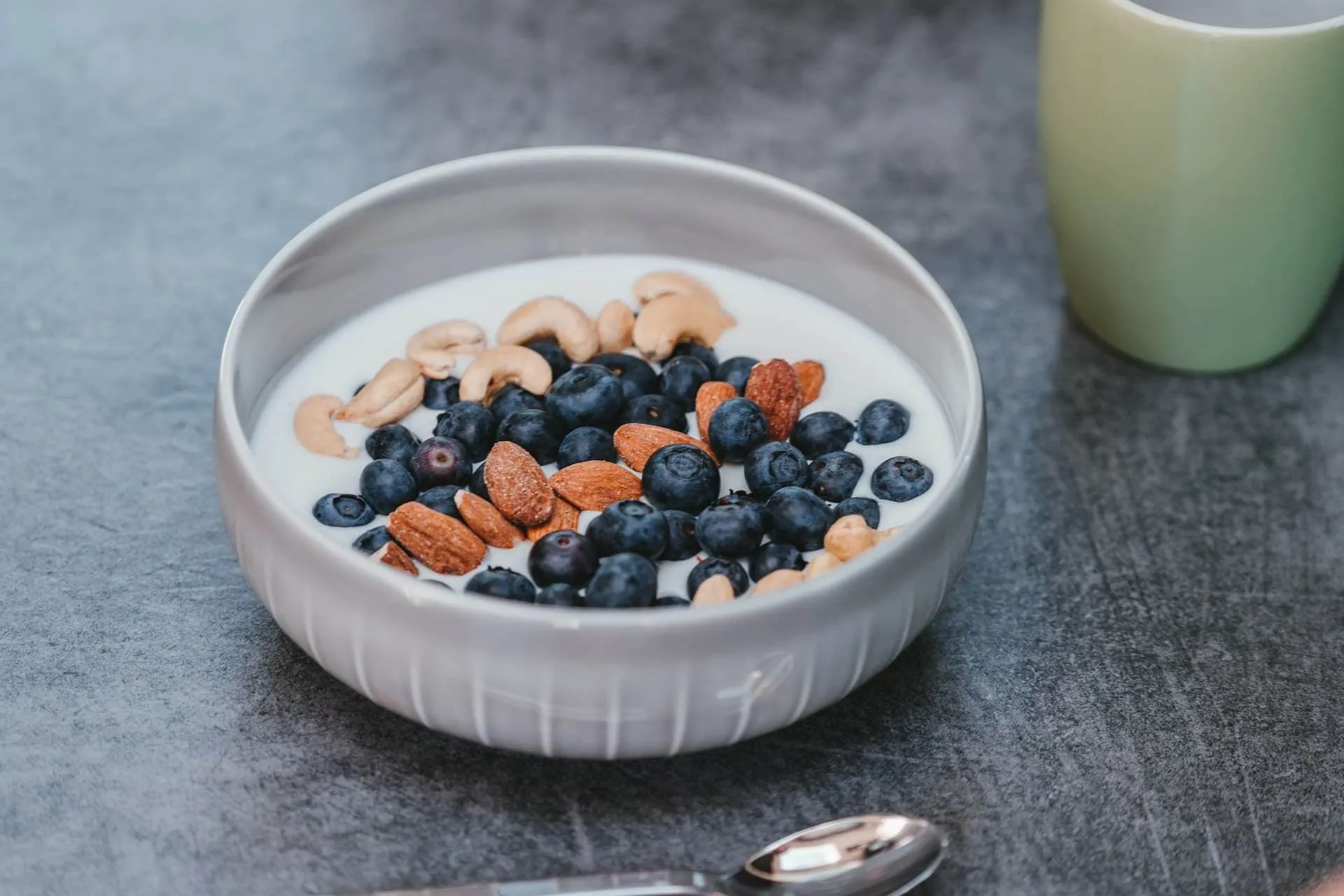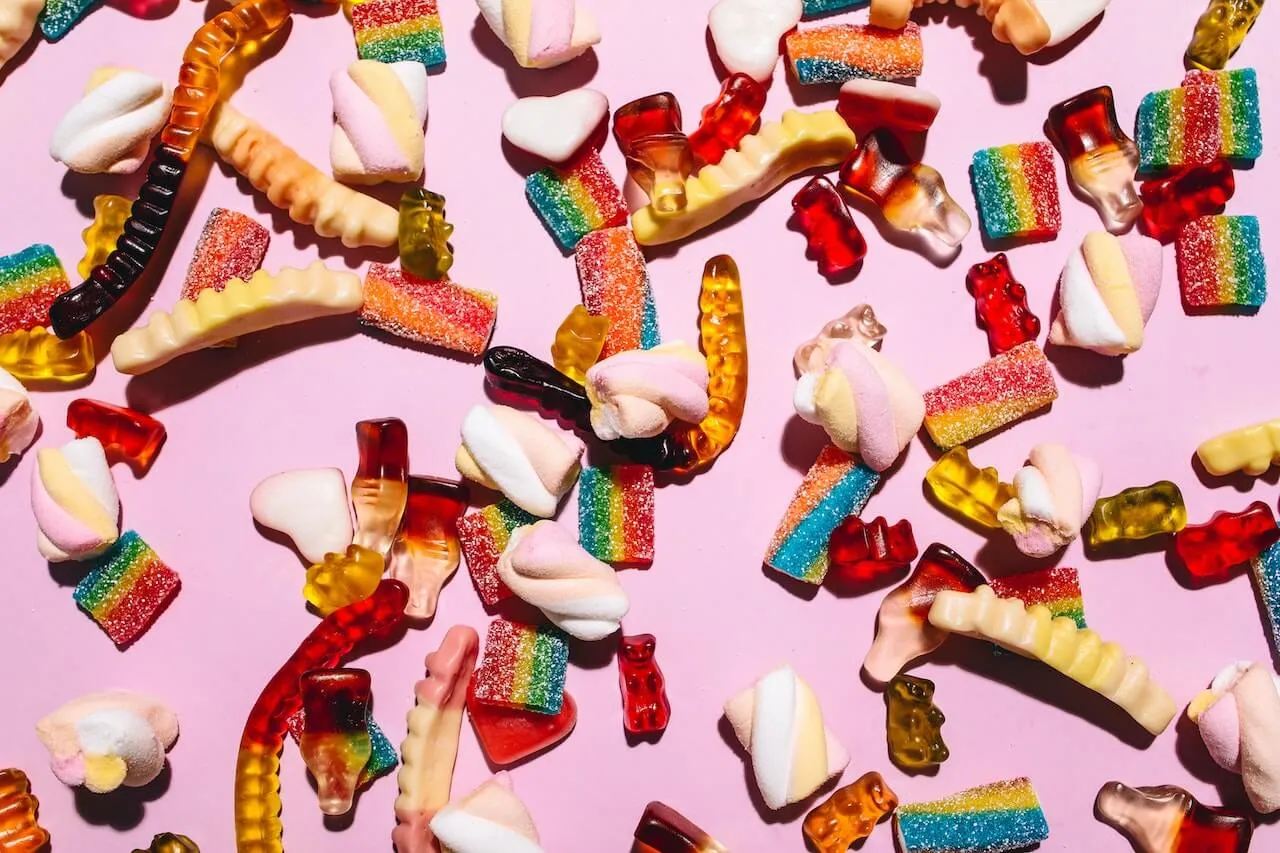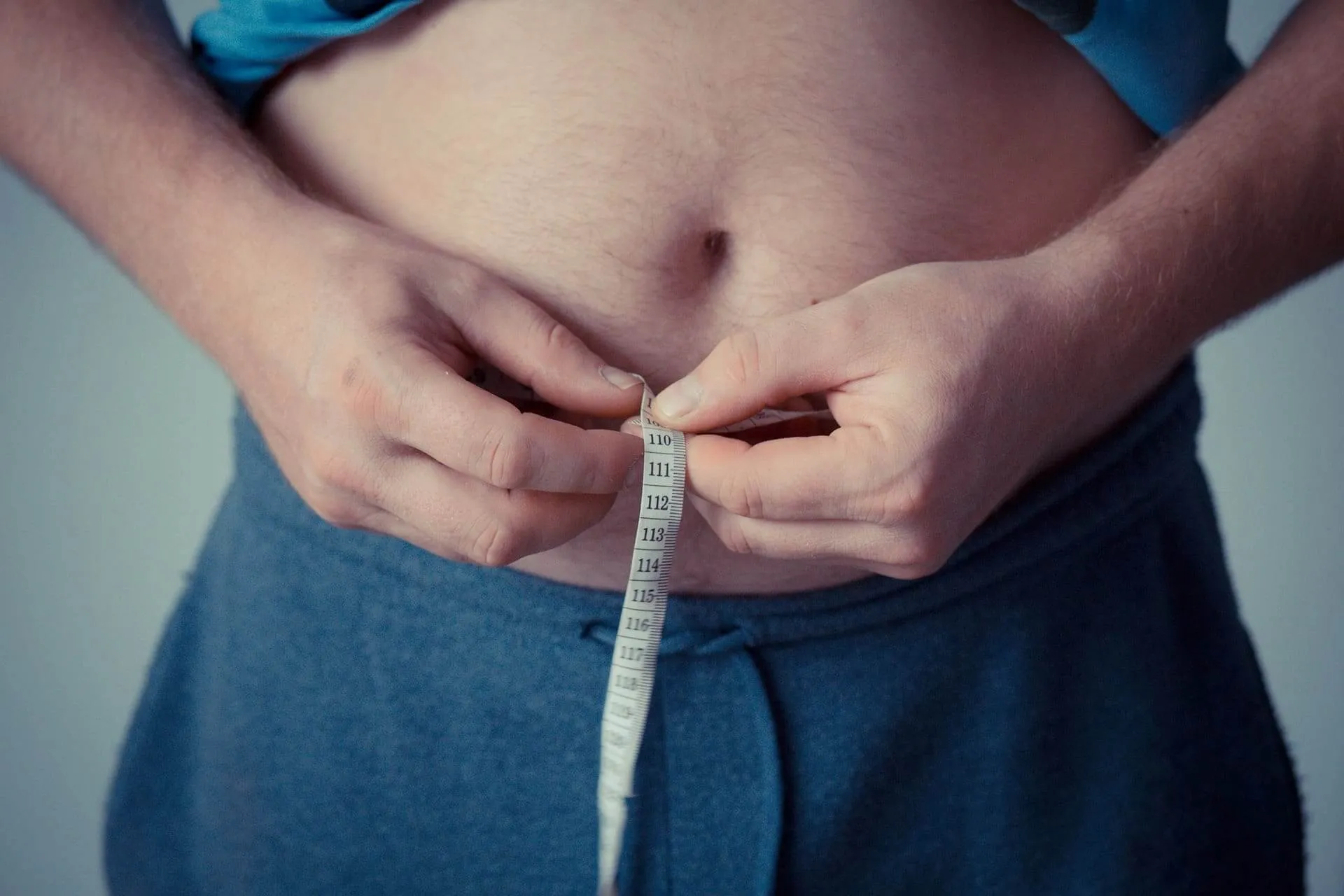There’s a reason gut health is such a hot topic: It's estimated that 60 to 70 million Americans deal with digestive issues of some kind, and a survey found that 40% of Americans stopped activities like exercise or spending time with family and friends in the last year due to uncomfortable bowel symptoms. Those are staggering numbers, so if you’re wondering what helps with digestion, you aren’t alone.
Digestion is the breakdown of food into smaller parts that your body uses as fuel. It starts in the mouth (chewing) and either travels through or involves multiple organs like the stomach, small intestine, liver, and pancreas until it reaches the large intestine. Digestive health means the optimal breakdown and absorption of nutrients and the elimination of waste products from your body.
Here are 13 ways to improve digestion so you can get back to your life.
{{mid-cta}}
1. Focus on Fruits and Vegetables
It may sound like cliché nutrition advice, but eating more fruits and vegetables is one of the best ways to improve digestion. Fruits and vegetables provide essential nutrients to support your health, but they also contain other substances like fiber and antioxidants that promote gut health.
The prebiotic fiber found in fruits and vegetables feeds your friendly gut bacteria. Prebiotics are associated with better gut health because they help maintain the balance of good bacteria in your intestines and increase short-chain fatty acid (SCFA) production, which helps lower inflammation in the gut and protect the intestinal lining.
We also can’t talk about digestion without mentioning bowel movements. Daily bowel movements are essential for a healthy gut, and fiber-rich foods like fruits and vegetables contain soluble fiber to bulk up your stools and help keep your digestive tract running smoothly.
2. Add More Nuts and Seeds

Nuts and seeds are small but mighty nutrient powerhouses. They provide fiber plus healthy fats that can support healthy digestion. Studies suggest that nuts and seeds can help by positively influencing the gut microbiome (the beneficial organisms that live in the GI tract). The gut microbiome is essential to digestive health and affects nearly every aspect of digestion, playing a crucial role in the breakdown and absorption of nutrients. A healthy microbiome means a balanced, diverse community of gut bacteria.
It's not just the fiber in the nuts that may influence the gut bacteria but also the presence of polyphenols. Polyphenols are plant compounds known for their antioxidant and anti-inflammatory properties, which can help reduce gut inflammation, promote digestive health, and lower the risk of digestive disorders.4
3. Manage Stress
You know that feeling when you’re stressed and your stomach is in knots? That’s how powerful stress is on the digestive system. Irritable bowel syndrome (IBS), constipation, acid reflux, and even digestive autoimmune conditions like ulcerative colitis (ulcers in the digestive tract) and Crohn's disease have close associations with stress.
If you think of the stress response as a built-in evolutionary response to a dangerous situation, it makes sense that all non-essential body functions like digestion would pause to give energy to the muscles and heart. But when stress is chronic, it can wreak havoc on digestive (and overall) health.
Unfortunately, we live in a stressful world, so sometimes stress is inevitable if you can’t walk away from your job or whatever the cause of stress is for you. Change what you can, but also focus on making adaptations to manage stress better can go a long way. One study on mindfulness-based stress reduction found these programs significantly improved symptoms of IBS.
4. Minimize Fried Foods and Processed Meats
Fried and processed foods aren’t considered healthy for a variety of reasons, including a higher risk of certain cancers and cardiovascular problems, but they also don't do your digestive health any favors. Fried foods are harder to digest because of their high-fat content, so the body has to work overtime to break them down. Many digestive health conditions are worsened by fried foods, including GERD, IBS, and Crohn's disease.
Along the same lines, processed deli meats, sausage, and bacon are also linked to digestive issues and even an increased risk of colon cancer. These foods often contain high levels of salt, preservatives, and other additives that can cause indigestion, trigger inflammation in the gut, or worsen existing conditions.
5. Move Your Body
There’s a strong correlation between sedentary lifestyles and digestive issues. Regular exercise helps stimulate the bowels and can improve digestive symptoms of constipation, bloating, and gas. It also reduces stress levels and promotes better sleep, both beneficial for gut health.
Some research indicates that low-impact exercises like yoga and walking or aerobic activity may help reduce symptoms of digestive conditions like IBS to improve overall digestive function.
6. Keep an Eye on Added Sugars
Added sugars are those that are not naturally found in foods but are added during processing or preparation. These include sugars like high fructose corn syrup, dextrose, and cane sugar. While small amounts of added sugars can be part of a healthy diet, consuming too much is associated with inflammation and poor gut microbiome health.
The exact reason why added sugars are so harmful to digestive health is not fully understood, but it's thought that they feed harmful bacteria in the gut and disrupt the balance of good bacteria. Additionally, excess sugar consumption can lead to weight gain, which increases the risk for conditions like GERD and IBS.
<p class="pro-tip"><strong>Learn More: </strong><a href="slow-digesting-carbs-and-blood-sugar-control">Slow-Digesting Carbs and Blood Sugar Control</a>.</p>
7. Stay Hydrated
Proper hydration is crucial for maintaining good digestive health, especially for preventing and managing constipation. Research has shown that dehydration can contribute to constipation by disrupting the water balance and slowing down the movement of stool through the digestive system.
When you increase fiber, fluid needs also increase to prevent constipation. Try to drink water, herbal tea, and sparkling water throughout the day, even before you feel thirsty. Foods with high water content, like melon, bell peppers, celery, and cucumbers, can also add to your total intake.
8. Bump up Your Intake of Whole Grains
Whole grains like brown rice, quinoa, and whole wheat are also excellent sources of dietary fiber. These plant-based foods are essential for the digestive tract because they help keep things moving to prevent constipation. Whole grains also have the added benefit of being rich in prebiotics, to act as food for beneficial bacteria in the gut.
Research on people with a higher intake of whole grains has shown that they have a significantly lower risk of developing digestive issues like constipation, diverticular disease, and hemorrhoids.
Incorporating more whole grains into your diet can be as simple as swapping out refined grains for whole grain options. Whole grain options also tend to be more filling, which can help you keep tabs on portion sizes.
9. Cook at Home More Often

The temptation to resort to takeout or go out to eat after a long day is real, but when you cook at home, you have a lot more control over the ingredients in your meals, positively influencing your digestive health. Foods eaten at restaurants tend to be higher in sodium, unhealthy fats, and added sugars. Preparing meals at home lets you choose fresh ingredients and control portion sizes.
Also, if you have digestive issues, you are more likely to be sensitive to specific foods, making it harder to find safe options when eating out. By cooking at home, you can tailor your meals to your personal needs and preferences.
10. Prioritize Probiotics
Prebiotics are the fuel that feeds the bacteria, but probiotics are the actual beneficial bacteria that populate the gut. There are many different strains of probiotics, some better than others for digestive health. Studies have shown that certain strains of probiotic supplements can help with an array of digestive health conditions by supporting a healthy microbiome, protecting the gut lining, and lowering inflammation.
You can find probiotics in supplement form if you are looking for a particular strain or therapeutic dose, but fermented foods also contain probiotics. Yogurt, kefir, sauerkraut, kombucha, kimchi, and miso are all examples of fermented foods that can help support the good bacteria in your gut.
11. Slow Down and Chew Your Food
It sounds simple, but most of us eat too fast and don't chew our food thoroughly. Digestion begins in the mouth, where enzymes in saliva start breaking down food before it even reaches the stomach. Some research suggests that chewing more helps increase the gut hormones that influence satiety, which could help you feel full and potentially reduce overeating.
Besides aiding digestion, slowing down and thoroughly chewing your food can also help minimize bloating, gas, and heartburn related to indigestion. By taking the time to eat, you're giving your digestive system enough time to break down the food and absorb the nutrients.
12. Sip Peppermint Tea
Peppermint tea has been used for centuries as a natural remedy for digestive issues. Clinical studies have shown that peppermint oil can alleviate irritable bowel syndrome (IBS) symptoms, such as abdominal pain, bloating, and gas.
Try sipping on a cup of peppermint tea after a meal to help with digestion and soothe any discomfort you may be feeling. You can also take peppermint oil capsules if you don't enjoy drinking tea (check with your healthcare provider first). The one group who should skip the peppermint is those with gastroesophageal reflux disease (GERD), as mint could worsen symptoms.
13. Get Enough Sleep
The more we learn about sleep, the more we realize its importance for our overall health. Lack of sleep has been linked to numerous health issues, including digestive problems. One study examining sleep's effect on gastrointestinal functioning in common digestive diseases found that lack of sleep plays a vital role in conditions like GERD, IBS, and IBD.
People with digestive diseases may also experience disrupted sleep due to symptoms like stomach pain and frequent trips to the bathroom during the night, so the two issues can become a vicious cycle.
Support Healthy Digestion by Understanding How Food Impacts Your Body
Since we are all unique individuals, what works for one person's digestion may not work for another. Paying attention to how different types of food make you feel and adjusting your diet can make a huge difference in your overall wellness and how you feel each day.
While making diet and lifestyle changes to support digestive health, the Signos app, paired with a continuous glucose monitor (CGM), can help you make individualized choices to optimize your metabolic health. You can learn more about how Signos works or see if it's a good fit for you by taking a quick quiz here.
<p class="pro-tip"><strong>Also Read: </strong><a href="lying-down-after-eating">Lying Down After Eating: Is it Bad for Digestion? + Tips</a>.</p>
Topics discussed in this article:
References
- Gastro.org. (n.d.). New Survey Finds Forty Percent of Americans' Daily Lives Are Disrupted by Digestive Troubles. Retrieved from https://gastro.org/press-releases/new-survey-finds-forty-percent-of-americans-daily-lives-are-disrupted-by-digestive-troubles
- Carlson, J. L., Erickson, J. M., Lloyd, B. B., & Slavin, J. L. (2018). Health Effects and Sources of Prebiotic Dietary Fiber. Current developments in nutrition, 2(3), nzy005. https://doi.org/10.1093/cdn/nzy005
- van der Schoot, A., Drysdale, C., Whelan, K., & Dimidi, E. (2022). The Effect of Fiber Supplementation on Chronic Constipation in Adults: An Updated Systematic Review and Meta-Analysis of Randomized Controlled Trials. The American journal of clinical nutrition, 116(4), 953–969. https://doi.org/10.1093/ajcn/nqac184
- Mandalari, G., Gervasi, T., Rosenberg, D. W., Lapsley, K. G., & Baer, D. J. (2023). Effect of Nuts on Gastrointestinal Health. Nutrients, 15(7), 1733. https://doi.org/10.3390/nu15071733
- Qin, H. Y., Cheng, C. W., Tang, X. D., & Bian, Z. X. (2014). Impact of psychological stress on irritable bowel syndrome. World journal of gastroenterology, 20(39), 14126–14131. https://doi.org/10.3748/wjg.v20.i39.14126
- Ge, L., Liu, S., Li, S., Yang, J., Hu, G., Xu, C., & Song, W. (2022). Psychological stress in inflammatory bowel disease: Psychoneuroimmunological insights into bidirectional gut-brain communications. Frontiers in immunology, 13, 1016578. https://doi.org/10.3389/fimmu.2022.1016578
- Naliboff, B. D., Smith, S. R., Serpa, J. G., Laird, K. T., Stains, J., Connolly, L. S., Labus, J. S., & Tillisch, K. (2020). Mindfulness-based stress reduction improves irritable bowel syndrome (IBS) symptoms via specific aspects of mindfulness. Neurogastroenterology and motility, 32(9), e13828. https://doi.org/10.1111/nmo.13828
- Gao, J., Guo, X., Wei, W., Li, R., Hu, K., Liu, X., Jiang, W., Liu, S., Wang, W., Sun, H., Wu, H., Zhang, Y., Gu, W., Li, Y., Sun, C., & Han, T. (2021). The Association of Fried Meat Consumption With the Gut Microbiota and Fecal Metabolites and Its Impact on Glucose Homoeostasis, Intestinal Endotoxin Levels, and Systemic Inflammation: A Randomized Controlled-Feeding Trial. Diabetes care, 44(9), 1970–1979. https://doi.org/10.2337/dc21-0099
- Yun, Z., Nan, M., Li, X., Liu, Z., Xu, J., Du, X., Dong, Q., & Hou, L. (2023). Processed meat, red meat, white meat, and digestive tract cancers: A two-sample Mendelian randomization study. Frontiers in nutrition, 10, 1078963. https://doi.org/10.3389/fnut.2023.1078963
- Alame, A. M., & Bahna, H. (2012). Evaluation of constipation. Clinics in colon and rectal surgery, 25(1), 5–11. https://doi.org/10.1055/s-0032-1301753
- D'Silva, A., MacQueen, G., Nasser, Y., Taylor, L. M., Vallance, J. K., & Raman, M. (2020). Yoga as a Therapy for Irritable Bowel Syndrome. Digestive diseases and sciences, 65(9), 2503–2514. https://doi.org/10.1007/s10620-019-05989-6
- Bianco, A., Russo, F., Franco, I., Riezzo, G., Donghia, R., Curci, R., Bonfiglio, C., Prospero, L., D'Attoma, B., Ignazzi, A., Campanella, A., & Osella, A. R. (2023). Enhanced Physical Capacity and Gastrointestinal Symptom Improvement in Southern Italian IBS Patients following Three Months of Moderate Aerobic Exercise. Journal of clinical medicine, 12(21), 6786. https://doi.org/10.3390/jcm12216786
- Burr, A. H. P., Ji, J., Ozler, K., Mentrup, H. L., Eskiocak, O., Yueh, B., Cumberland, R., Menk, A. V., Rittenhouse, N., Marshall, C. W., Chiaranunt, P., Zhang, X., Mullinax, L., Overacre-Delgoffe, A., Cooper, V. S., Poholek, A. C., Delgoffe, G. M., Mollen, K. P., Beyaz, S., & Hand, T. W. (2023). Excess Dietary Sugar Alters Colonocyte Metabolism and Impairs the Proliferative Response to Damage. Cellular and molecular gastroenterology and hepatology, 16(2), 287–316. https://doi.org/10.1016/j.jcmgh.2023.05.001
- Thalheimer, A., & Bueter, M. (2021). Excess Body Weight and Gastroesophageal Reflux Disease. Visceral medicine, 37(4), 267–272. https://doi.org/10.1159/000516050
- Rollet, M., Bohn, T., Vahid, F., & On Behalf Of The Oriscav Working Group (2021). Association between Dietary Factors and Constipation in Adults Living in Luxembourg and Taking Part in the ORISCAV-LUX 2 Survey. Nutrients, 14(1), 122. https://doi.org/10.3390/nu14010122
- Jefferson, A., & Adolphus, K. (2019). The Effects of Intact Cereal Grain Fibers, Including Wheat Bran on the Gut Microbiota Composition of Healthy Adults: A Systematic Review. Frontiers in nutrition, 6, 33. https://doi.org/10.3389/fnut.2019.00033
- Liu, Q., Kang, Y., & Yan, J. (2022). Association between overall dietary quality and constipation in American adults: a cross-sectional study. BMC public health, 22(1), 1971. https://doi.org/10.1186/s12889-022-14360-w
- Latif, A., Shehzad, A., Niazi, S., Zahid, A., Ashraf, W., Iqbal, M. W., Rehman, A., Riaz, T., Aadil, R. M., Khan, I. M., Özogul, F., Rocha, J. M., Esatbeyoglu, T., & Korma, S. A. (2023). Probiotics: mechanism of action, health benefits and their application in food industries. Frontiers in microbiology, 14, 1216674. https://doi.org/10.3389/fmicb.2023.1216674




.svg)










.svg)
.svg)
.svg)
.svg)
.svg)
.svg)
.svg)
